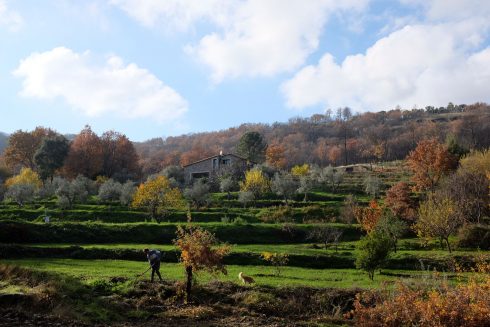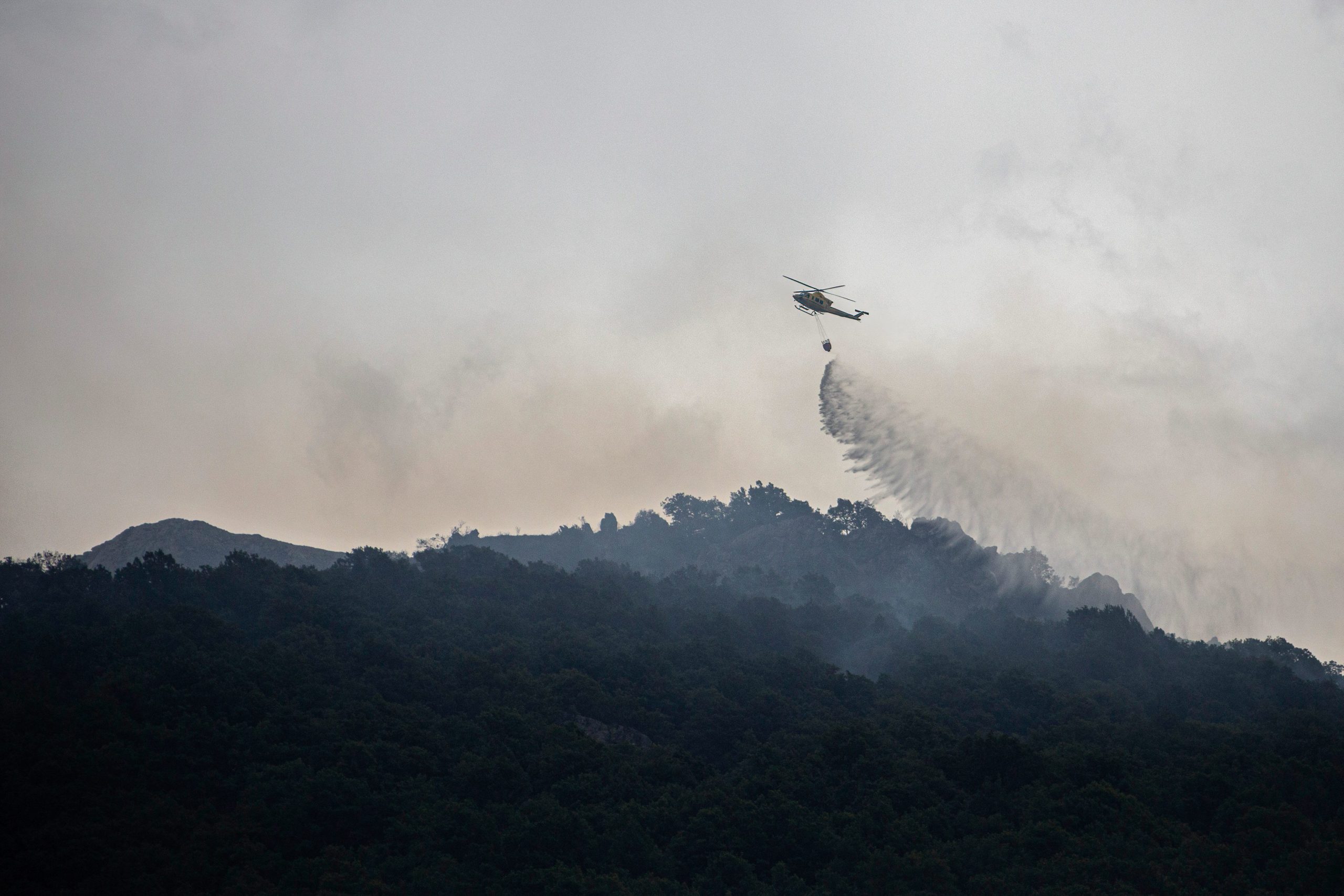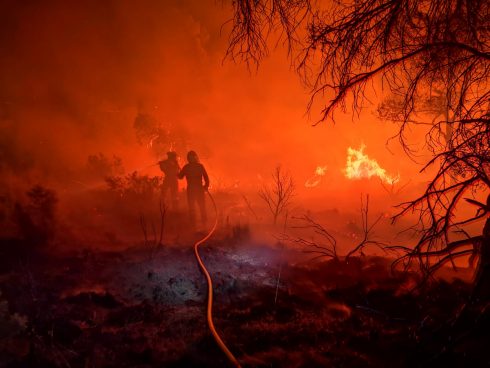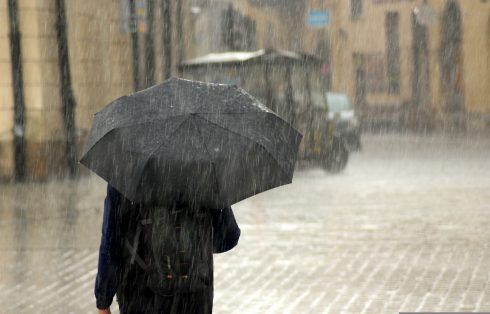SUMMER dragged on in its grim-faced way…And just as it seemed August’s annoyances couldn’t get any worse, suddenly and dramatically, they did.
It can never happen to you: that’s a certainty you cling to. It can never belong in the universe of possibilities pertaining to your life. It’s something that happens to other people in other places, places more arid and godforsaken, unfortunate places where things would have gone wrong anyway, you sense, though perhaps not in such a swingeing and destructive and traumatic manner. Every summer there were news stories on the TV, forming almost a particular genre, like overcrowding on the beaches or traffic jams on the motorways as city- dwellers fled for the coast. I watched the images of the sky turned Judgement Day red by the flames, the agony etched on the faces of people who had lost their homes, their animals, their livelihoods, and though I felt the pity of it all there was a smugness at the core of my being, a comforting voice that whispered in my ear: Yes, of course it must be awful, but it’s an experience you will never have to face. The verdant oak and chestnut woods encircling our land were a kind of insurance policy; their dark-green shade would protect us.
The thing starts in a small way, a germ of fear that grows as it feeds on the dry tinder of your complacency.
It’s your sense of smell, as is often the case, that tells you something’s up. Padding outside in bare feet to sample the day, still half-asleep, I sniffed the air. Smoke. I noticed a grey blurring in the air, a weird kind of morning mist, but so thick the village was barely visible. Smoke.

For a while all is quiet. You go about your tasks. That day I had fruit trees to water and six buckets of aubergines to deal with. My battle plans included a chutney with garlic, a smoky baba ghanoush, and melanzane alla parmigiana with mozzarella and tomato sauce. I’m just frying the first batch of aubergine slices when I hear the helicopter. A whirr that becomes a thudding as it comes in low over the house. The dogs cower, peering skyward; the sheep have scattered. We run outside to see the giant red bag swinging underneath the ’copter, slack and empty for the moment, but brimful, spilling water over the sides, when it returns a few minutes later. Later there will be hydroplanes, too, coming and going. Whatever’s happening, it won’t affect us. Life, and our domestic routine, goes on. The aubergines go in the oven.

Wildfire has always been a fact of life in southern Europe. Burning stubble was common practice at the start of the summer. Baudilio often used to set light to a pile of vine prunings or a heap of woodland detritus against a wall: he called them his ‘flame-ups’. Thanks to the troops of goats whose grazing kept the forest clear of overgrowth, summer wildfires were brief and occasional. Somewhere along the line, fire had stopped being just another inconvenience and become an ever-present danger. Wildfires were increasingly common, increasingly virulent. No one ever knew for sure how these fires started. Sometimes it was an act of foolishness, a cigarette tossed from a car window, a stray ember from a still-glowing barbecue. More often it seemed they were started deliberately, perhaps by an arsonist with a grudge or a streak of perversion. Ultimately the immediate causes mattered a great deal less than the underlying, long-term ones. Longer, hotter summers. Milder, drier winters.
Changing rainfall patterns, with longer periods of drought coming between bouts of often torrential rain. The decline of the great herds of goats and sheep whose grazing once kept the landscape ‘clean’. Depopulation, and a rural society in which traditional woodland management is no longer practised, leading to overgrown forests full of dead wood and brush. Powder kegs waiting for a spark.
It was said the fire had started outside a village a few miles away. By mid-morning the fire brigade were at the scene and had quickly put it out. They retired for lunch, and in their absence a wind came up and the flames revived. By the time they returned the fire was gaining ground, spreading on two fronts up the hill and down towards the village. The ‘three 30s’, said to be the indicators of catastrophic wildfire risk, were all in place: that is, less than 30 per cent humidity, more than 30°C and a wind speed above 30 km/hour. We were heading for disaster and we didn’t even know it.
In the fantasy I’d always entertained, the church bells would be tolling, and this would be the signal for the villagers to rush out with brooms and buckets in a communal, all-in-this- together effort to beat back the fire’s creeping spread. Initially, however, there was no panic, but a mixture of excitement, alarm and curiosity: where was the fire? Was it spreading? This of course was the time of year for it. If I could catch the man who did this, I tell you I’d have his guts for garters. But when the novelty wore off I noted a collective shrugging of shoulders: it was in another village. The firemen would deal with it. It was an inconvenience. Martín’s mother was busy at the clothes line on her first-floor balcony: ‘I’ll have to wash it all again, can’t have it smelling of smoke,’ she called down to me.
And all the time the comings and goings of helicopters, the thud-thud-thud of their blades as they came in low like in Apocalypse Now. On the second day there were fleets of hydroplanes with big bellies for scooping up water. All day they flew overhead, back and forth, back and forth. The smoke was thicker now, catching in your throat, drifting on the wind like a thick fog, the sun at the back of it a grubby yellow blur like a half-sucked sweet.
Meanwhile the WhatsApp messages came in thick and fast, a whirl of confusion and, increasingly, of worry. Is the fire out of control? Has it reached this or that village? It’s looking like a big one. Four thousand hectares already burned, they say. Firefighters drafted in from neighbouring provinces. Even from Portugal. Did you see the nightly news? We were mentioned in a report on the summer’s biggest fires so far. Well, it’s good to be famous for something.
When the wi-fi went down we were plunged into an uncanny silence. Phone coverage was reduced to a single bar. Maybe the 4G mast had been damaged. Outside the smoke was now a choking cloud, but there was no flame, no red skies, nothing to indicate that the fire was coming closer. So we shut ourselves indoors and busied ourselves making ratatouille and strawberry ice cream. We became so used to the war-zone rumble of planes and helicopters passing overhead that we were even able to sleep through it. Four days went by. There was no official communication, no warnings, no information. There were very few phone calls. No one knew anything. The fire was out there somewhere but posed no danger to us. We even forgot to be afraid. After all, it was happening somewhere else, and to other people. It was their problem; their misfortune; their tragedy. We clung to our selfishness to keep us sane.
On the night of the fourth day our luck ran out. For three days the prevailing southerly wind had fanned the flames away from the village and down towards the plain. Now the wind abruptly changed direction. Huge gusts blew up the valley carrying with them a miasma of smoke and dust. But I felt nothing. Four days after the initial shock, my resources of panic were exhausted. A strange calm had settled over my mind. I’d lost my appetite. All I wanted was to sleep, and to wake up when it was all over.
Nacho, however, was nervous. Pacing around the house, watching through the windows. Maybe he had intuited something, but it just looked like paranoia to me.
‘I think we should both stay up. Take turns to keep watch.’ ‘Come on, now. The fire’s burned everything it had to burn. I think we need to sleep. This thing has really taken its toll on me. You should get to bed, too. We’ll check it out in the morning.’
‘Do what you like, but I’m staying up.’ ‘Whatever.’
It was 3 a.m. when he shook me awake.

‘Come and look at this,’ he said, leading me to a window. The fierce north wind that had whipped up overnight was carrying the fire in our direction. Somewhere down the valley was a great nebulous, whirling tornado of smoke with an evil orange glow at its core. Hard to tell how close it was, but the towering scale of it sent a shock of primitive terror through me. The phone rang: one of the few calls to get through. It was Lucía. ‘Have you seen? It’s moving up towards you. I’m calling because I think it’s time you thought about leaving. No, I’ll rephrase that: you need to get out. Right now.
I dumbly assented. Without saying a word we hurried around the house, closing doors, picking things up, putting them down. What do you take with you when your house is about to burn down? How many times in the past had I idly played that mental parlour game? Passport, wallet, obviously. A change of clothes. Computers. I wrapped up mine in a blanket. What about the dogs? The four small ones would fit in the back of the car but Lola, the great lumbering mastiff the size of a Thelwell pony, would have to fend for herself. I told myself she’d find a damp cool spot somewhere and take refuge; she’d be fine. And then we were driving fast up the track, away from the life we’d made, away from the learnings, the plans, the triumphs and failures.
At the entrance to the village the road was blocked, flames leaping among the scrub on both sides. Police sirens wailed, red lights flashing. The fire had reached the first houses on the outskirts and trashed them summarily, destroying various stables and an ancient posthouse. We made a U-turn and drove back along the main road to a neighbouring village in the lee of the wind, waking up Elena to beg for a room at the inn. At the door in her night dress, our friend peered through dazed, sleepy eyes at what must have seemed a strange apparition at this hour of the morning: a pick-up truck full of computer screens swaddled in blankets, clothes hastily stuffed into supermarket bags, and several dogs.
Here at least we would be safe. Relief is the strongest kind of tranquilliser: I slept until midday, waking in the quiet of a village where nothing had altered the routine of a summer day, except for the smoke filling the streets. Now there were no bars at all on our phones. With no one to call and no news of the fire, we spent the day in an information limbo. It was like retreating from the trenches of the First World War to some country place behind the front line where life continued its gentle, comforting routines.
Smoke, flame, noise, chaos, unanswered phone calls, rumours, worry, fear, tension, sleepless nights, exhaustion, desolation, relief, tears, hugs, anger, coals, ashes, silence.
I’ve heard it said the first thing people notice after a wildfire is the lack of birdsong. The unbearable weight of silence. True, but a lonely eagle glides over our blackened forest in search of a non-existent nest. And our oasis-like corner, spared largely from the rip-roaring flames, I suspect now harbours a refugee bird population.
Luck, or providence, has been on our side. We keep finding evidence of this. The wall-building work beside the house that had created a long barrier of grass-free dust, stopping the creeping flames in their tracks.
The way our watered and strimmed and cared-for land was respected by the fire – even a wildfire has principles – as it devoured all the abandoned and overgrown thickets in its path. The sometimes extraordinary distinctions it appears to have made, whether to destroy or leave well alone.
The chicken house: woodland behind it frazzled right up to the wall, the lean-to where the birds lay and sleep, demolished as if with a sledgehammer, while the rest of the building remains uncannily intact, the rabbits continuing their placid existence, the hens having retreated into the yard out front.
For days my heart has been in my mouth. The feelings are raw, like an unhealed wound. Emotion rises in my throat and catches there at the oddest moments, such as when an announcement from the town hall rings out across the charred valleys, the folksong used as a prelude sounding now like a doleful lament.
Click here to read the first extract: HIDDEN VALLEY: BATTEN DOWN THE HATCHES
Click here to read an interview with Paul.
Hidden Valley: Finding freedom in Spain’s deep country is published by Abacus Books.
Paul Richardson has written half a dozen travel books, his first being; Not Part of the Package: A Year in Ibiza










